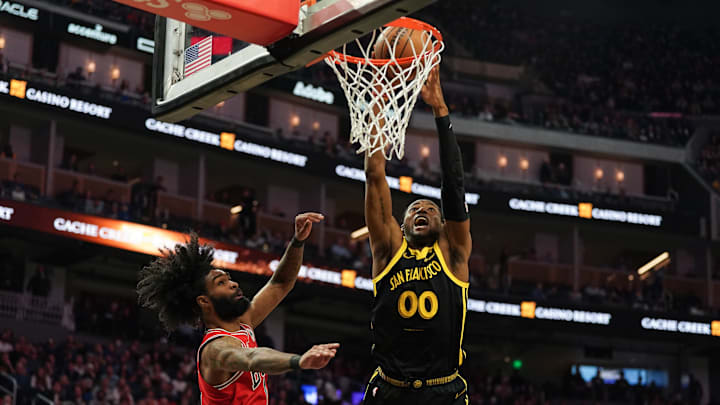If the Golden State Warriors are hoping to complete a Jonathan Kuminga sign-and-trade for a meaningful upgrade, then Coby White and the Chicago Bulls would have the answers they're searching for. It's a proposal that one writer believes would benefit all parties involved.
Upon further inspection, it's become impossible to ignore how much better both the Bulls and Warriors would be if such a trade could be struck.
Grant Hughes of Bleacher Report took on the task of coordinating a Kuminga sign-and-trade in which all involved parties emerge victorious. What Hughes landed on was a deal between the the Bulls and Warriors that would achieve the seemingly impossible goal of making the stars align.
The logistics of a trade would require Kuminga to accept a first-year base salary of no more than $20,388,889, but a swap for White could be completed under those circumstances.
As a result, the Bulls would land a high-level scoring wing, the Warriors would add a versatile offensive dynamo, and Al Horford could still be signed for the Non-Taxpayer Mid-Level Exception.
Why Jonathan Kuminga for Coby White would help the Bulls
The reasons Chicago might consider this deal are multifaceted. The most obvious appeal is on the court, where Kuminga would give them an athletic 6'7" attacking wing who has proven himself as a scorer during the regular season and postseason alike.
The other reason the Bulls might be open to this move is the simple fact that re-signing White in 2026 will be a complicated pursuit.
White is eligible for an extension, but the new CBA would cap him at a first-year salary in the range of $21 million. That's far less than he could get on the open market in 2026, when he'll be an unrestricted free agent.
White has already played six seasons with the Bulls, but his touches have been limited relative to his offensive proficiency despite the team finishing below .500 in five of those six years.
With this in mind, there's a realistic possibility that White will utilize his unrestricted free agency in 2026 to leave Chicago. If the Bulls are operating with that fear in mind, then they'd be wise to complete a trade for a player with long-term value—particularly one who thrives as a high-volume scorer.
Kuminga checks that box for Chicago with career averages of 20.5 points per 36 minutes in the regular season and 22.3 in the playoffs.
Why Jonathan Kuminga for Coby White would help the Warriors
For Golden State, the appeal of this trade is simple: White is one of the most dynamic young scoring guards in the NBA. In 2024-25, he ranked No. 12 amongst qualified players in drives per game and No. 17 in points via drives.
White shot 53.0 percent in said scenarios, which ranked No. 10 among qualified players who averaged at least 10.0 drives per game.
Not to be confused with a purely downhill player, White shot 38.4 percent on catch-and-shoot threes and 37.0 percent from beyond the arc overall. It was the fourth consecutive season during which he converted at least 37.0 percent of his shots from distance.
With impressive volume and efficiency at 20.4 points per game on .453/.370/.902 shooting, White could step in and thrive as the all-around scoring threat Golden State desperately needs.
White's ability to create for himself, work without the ball, and even excel as a distributor at 4.8 assists per game over the past two seasons would instantly transform the Warriors' offense. Jimmy Butler would carry a more manageable workload as a slasher, while Stephen Curry would receive much-needed help as a shooter.
A bridge-the-gap type of player who offers the offensive versatility the Warriors were hoping to see Kuminga develop, White could be a landscape-altering addition.
Would Coby White sign long-term with the Warriors?
The only true holdup in this situation is the simple question of whether or not Golden State can justify trading for an expiring contract. White will make a team-friendly $12,888,889 in 2024-25, and will almost certainly be interested in earning more per season than an extension would permit.
Unlike the Bulls, however, the Warriors can offer White an instant opportunity to contend—and thus have a unique form of leverage in future negotiations.
White has played just five playoff games through six seasons, which reflects far more on Chicago than himself. The Bulls have gone 72-81 when White has played over the past two seasons, including a 17-13 record after trading Zach LaVine.
That may give Chicago reason to decline a trade offer for White, but this is the epitome of a mutually beneficial deal.
For the Bulls, they would avoid the potential loss of White to unrestricted free agency and add a 22-year-old proven scorer with untapped potential and a multi-year contract in his place. For the Warriors, they'd bring in a versatile scorer who can play in a featured or co-starring offensive role.
Compounded by finally finding a deal that makes the finances align to still sign Horford, this is as ideal a sign-and-trade as the Warriors are likely to find.
